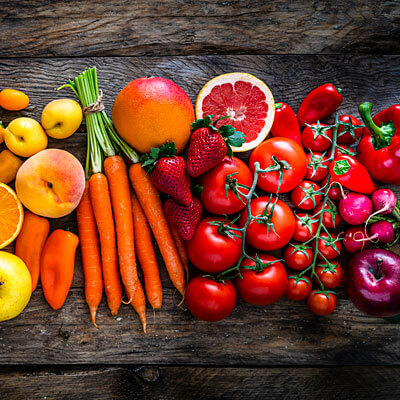
As previously discussed, we want to review the most common general recommendations to reduce inflammation through dietary change. As always, you should speak to your family doctor before making drastic changes to make sure they are suitable for your health profile.
A diet that controls inflammation is high in antioxidants from fruits and vegetables that are known for their anti-inflammatory properties. Incorporate these foods in your diet. Remember to stay within your allowed macros and calories listed previously.
- Fruits: apples, acerola berries, fresh pineapple, guavas, grapefruits and rhubarb, kiwi fruit, lemons, limes, oranges, kumquats, black currants, blueberries, raspberries, mulberries and strawberries, papaya, cherries, and tomatoes.
- Vegetables: Spinach, sweet potatoes, bell peppers, cabbage, bok choy, onions, leeks, garlic, green onions, broccoli, cauliflower, broccoli sprouts, brussel sprouts and greens.
- Herbs & Spices: basil, oregano, mint, cloves, turmeric, cayenne peppers, chili peppers, parsley, rosemary
- Fish & Meats: Cod, Halibut, Salmon, snapper, bass, whitefish, herring, trout, sardines, grass-fed beef, pork, naturally-raised (not on grain) chicken and turkey.
- Whole Grains: brown rice, whole wheat, buckwheat, barley, rye, millet, spelt.
- Fats: extra virgin olive oil, avocado, hazelnuts, almonds, walnuts.
Foods you should avoid because they have been shown to increase inflammation in the body:
- Scientists and health practitioners know that consuming sugar, margarine, too many nuts and too many omega-6-polyunstaturated oils like corn, soy, walnut, vegetable and canola oil will increase inflammation in the body. They do this by traversing your arteries and activating prostaglandins in the body that are responsible for inflamed tissues.
- What happens is this: you eat a food. That food is then digested. The individual component parts of that food get absorbed in your bloodstream and travel throughout your body. If you ate a carbohydrate food, such as bread, sugary desserts, rice, cereal, milk products, pasta and candy – that food will affect the pancreas and send a signal to release insulin. Insulin brings down the blood sugar level. The higher the insulin level, the more that insulin will cause effects in the body. Some of these effects will cause increased inflammation. It makes sense to cut your “added” sugar consumption down to nothing.
